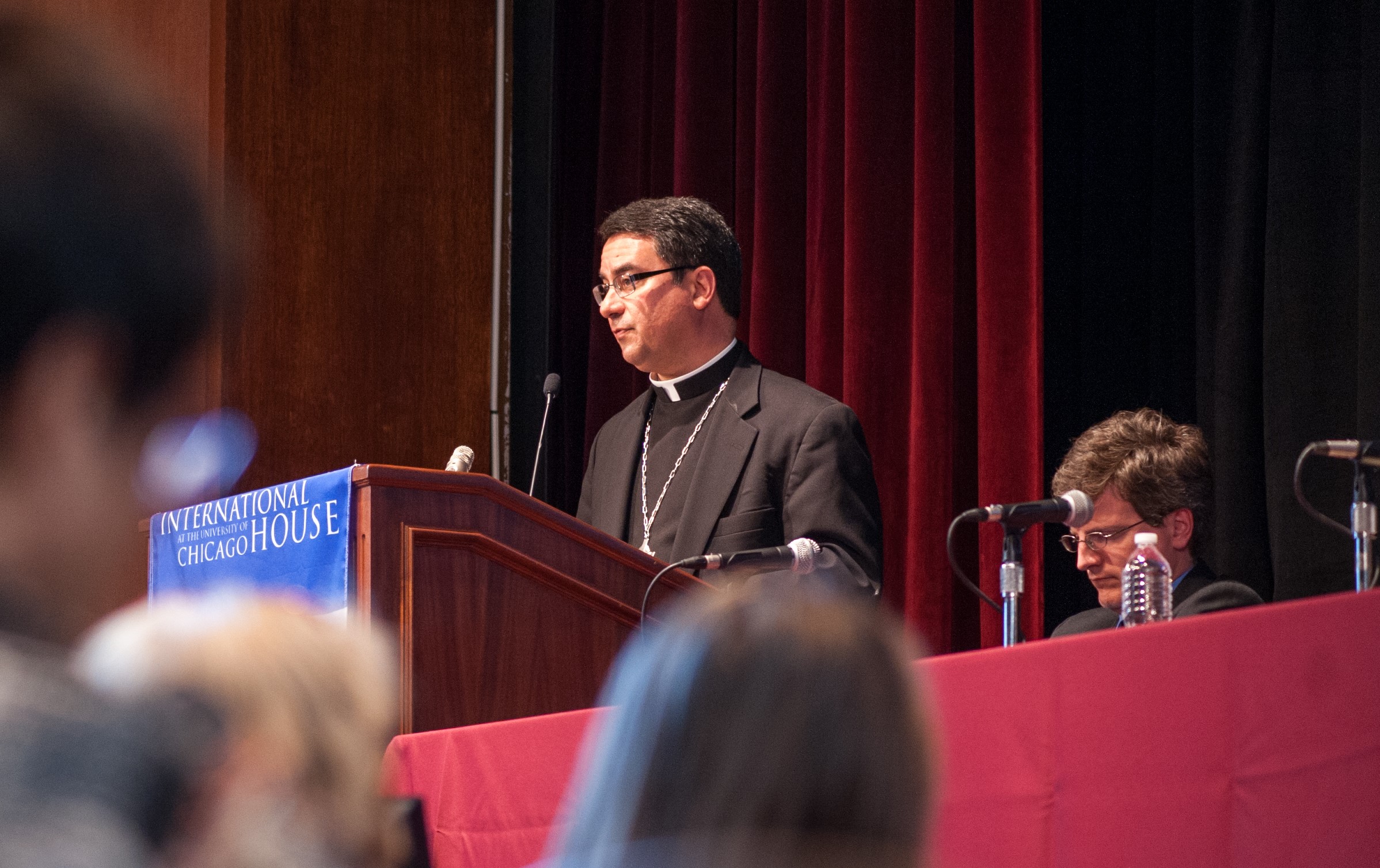
A keynote talk from Bishop Oscar Cantu of Las Cruces headlined the discussion of the family and its role in the economy on April 30 and May 1, as economists, bishops, and other scholars gather in Chicago for the Lumen Christi Institute’s 7th annual Conference on Economics and Catholic Social Thought. The theme, “The Family and the Changing Economy”, was quite timely, falling squarely between the two October meetings of the 2014-15 Synod of Bishops on the Family.
The public event was opened by Blase Cupich, Archbishop of Chicago, and involved responses by CREDO economists Valerie Ramey (UC-San Diego) and William Evans (Notre Dame), as well Pierre-Andre Chiappori (Columbia), a noted expert on the economics of the family, and Christine Firer Hinze (Fordham), a social ethicist focusing on the family.
Cupich, a participant in previous conferences, addressed the conference for the first time as the new Archbishop of Chicago. He reminded the audience that from its beginning Catholic social thought has centered on the family rather than the just the individual. Archbishop Cupich highlighted the back-and-forth interaction between the struggles that poor, and even middle class, families face in today’s economy, and the struggles of families in turn exacerbate poverty. He used immigrants as an example of interwined economic and familial struggles, and stressed the need for immigration reform. By quoting Popes Leo XIII, Benedict XVI, and Francis, and Cardinal George, he noted the need for exchanges between economics and Catholic social thought. “The market needs to be a means, not an end. The market cannot form our values.”
Bishop Cantu’s keynote discussed the nature of Catholic social principles, and the heart of its view of the family. “Catholic social teaching then refers to that body of principles based on the dignity of the human person, and the family as the basic cell of society.”

He drew a parallel between the family and the Trinity. “God is a community of three persons… the family mirrors the Trinity,” Like the Trinity, the family and human society are, “a kind of mysterious dialogue between the individual and communal.” Bishop Cantu explained that this Catholic view stands, “in direct opposition to the reduction of the individual to nothing more than an autonomous rights-bearing consumer.”
The family is “meant to be the training ground for all social relationships… the foundation for a whole society, a civilization of love,” but it faces many challenges, said Cantu.
“If you want to know how the bishops are going to feel about anything, just ask, ‘How will this impact the family?’” he explained.
Reflecting on his own pastoral experience, Bishop Cantu also stressed that the Church itself must do more to support families. “More and more, we need to teach some of the basic human skills that strengthen families. We can’t simply tell them about God.”
The two bishops talks were followed by complementary responses by leading academics.
Ramey addressed why economists are interested in the family, and what economists can bring to the conversation. In one example, she described how economists have analyzed how the importance of long term commitments are crucial for investments in the market, and drew an analogy with committed parents and their investment in children. “Study after study is finding that broken families, single heads of household, even blended families: the outcomes for children are not as good as they are when parents have a long term relationship with each other.”
In her discussion, Firer Hinze explained that in Catholic social ethics the purpose of an economy is to provide livelihoods for people and families. However, it often fails in this function of “inclusive provisioning” because we disorder priorities and confuse means with ends. “From this lens, an economy that doesn’t provide for participation and access to sustenance for all its members is kind of like a knife that doesn’t cut.” Historically, she explained that the living wage movement stemmed from an understanding of this function of an economy, with goals of securing both the market and household or familial functions.

Chiappori focused on several trends in the changing economy that are crucial to the family. First, he emphasized that human capital, both cognitive skills like education and noncognitive skills like socialization are becomingly increasingly important. Many of these skills are formed at very early ages in children, and the family plays a crucial role. Second, marriage rates have declined, especially among the less educated, and the fraction of children in single households has increased. Third, less educated families and single parent families spend less time with their children, further disadvantaging their children later in life and reducing upward mobility. “If you look at the long term consequences, in terms of inequality, I think they are extremely frightening,” he explained.
Evans wrapped up the panel, by examining the role of economic opportunities in the rise in unmarried childbearing. He explained that the rise in unmarried childbearing has been dramatic and pervasive across Western countries. Focusing on the U.S., he evaluated the declining job prospects for low-skilled men as a potential cause. Evans demonstrated that confusing correlation with causation can lead to erroneous conclusions, explaining how economists try to distinguish true causation. “The evidence is hard to come by… what evidence we do have suggests there is a role for the economy but it is clearly not the whole story.”
CREDO members Flàvio Cunha (Rice) and Joe Hotz (Duke) made presentations on the second day of the conference. The second day also included presentations by economists Anna Aizer (Brown), Kasey Buckles (Notre Dame), Kathleen McGarry (UCLA), and Claudia Olivetti (Boston University), as well as theologian Fr. Michael Sweeney (Dominican School of Philosophy and Theology) and sociologist Brad Wilcox (Virginia).
CREDO members Joe Hotz (Duke) and Valerie Ramey (UC-San Diego) organized the program. Full videos of the presentations are available HERE.






